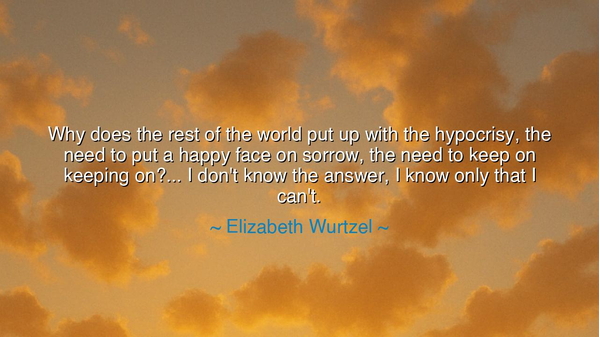
Why does the rest of the world put up with the hypocrisy, the
Why does the rest of the world put up with the hypocrisy, the need to put a happy face on sorrow, the need to keep on keeping on?... I don't know the answer, I know only that I can't.






In the piercing words of Elizabeth Wurtzel, the soul of a truth-teller speaks: “Why does the rest of the world put up with the hypocrisy, the need to put a happy face on sorrow, the need to keep on keeping on?... I don't know the answer, I know only that I can't.” These words are not the musings of despair, but the confession of one who has gazed upon the world’s endless performance and chosen honesty over illusion. In her voice echoes the cry of every heart that refuses to wear the mask of false joy. She speaks for those who can no longer pretend, who will not decorate their pain with empty smiles.
In the time of the ancients, philosophers spoke of authenticity—of living in accordance with one’s soul rather than the expectations of the crowd. Wurtzel’s lament is born from that same struggle: the battle between the inner truth and the outer façade. The world, she observes, demands that we smile through grief, that we disguise exhaustion with cheer, that we carry on even when our hearts have collapsed. Yet she, with fierce clarity, declares, “I can’t.” In that defiance lies a strange kind of courage—the bravery of refusing to lie about one’s suffering.
Consider the life of Søren Kierkegaard, the Danish philosopher who lived in the shadow of melancholy. He too walked among the cheerful, but his writings revealed a soul tormented by the emptiness behind their laughter. In his journals he wrote, “The most painful state of being is remembering the future, particularly the one you can never have.” Yet he did not hide behind a mask. Like Wurtzel, he dared to face the sorrow directly, to name it, to study it, and through that naming, to transcend it. Both remind us that denial may shield us for a moment, but truth—though it wounds—heals in the end.
The hypocrisy Wurtzel speaks of is the great pretense of our age and every age: the belief that to be broken is shameful, that to show pain is weakness. The ancients knew otherwise. They built temples for grief, sang dirges as sacred songs, and treated mourning as an act of reverence. In those times, sorrow was not a stain to be hidden—it was a teacher. But the modern world, in its haste, has forgotten this wisdom. It demands the illusion of perpetual happiness. It fears the rawness of honesty, for truth unsettles comfort, and grief reveals our shared fragility.
In her words—“I can’t”—we find not surrender, but rebellion. Elizabeth Wurtzel refuses to conform to the great lie. She would rather live truthfully in pain than falsely in peace. Her declaration reminds us that there is power in acknowledging what hurts. To say “I can’t” is to honor the limits of the human spirit and to admit that the soul, too, needs rest and honesty. There is dignity in that kind of confession, for it opens the door to compassion. Only when we stop pretending can healing truly begin.
From her cry we can draw this lesson: do not let the world’s demand for constant brightness extinguish your own depth. It is not your duty to smile through sorrow, nor to conceal your humanity behind the veil of optimism. Instead, face your pain with tenderness. Speak it aloud. Share it with those who can hear without judgment. In doing so, you do not burden the world—you liberate it. You remind others that they, too, may lay down their masks.
So, my listener, take these words into your heart: when sorrow visits, do not flee from it. When grief grips you, do not paint it with false colors. Instead, sit with it as you would an old friend, and let it teach you patience, humility, and truth. To live without pretense is the highest form of strength. Elizabeth Wurtzel’s lament is not the cry of defeat, but the awakening of the honest soul—the one that refuses to bow to the tyranny of false joy. Let us, then, learn to honor our sorrow as the ancients did, and from its depths rise not with a mask, but with the quiet, unshakable grace of one who has faced life as it truly is.






AAdministratorAdministrator
Welcome, honored guests. Please leave a comment, we will respond soon